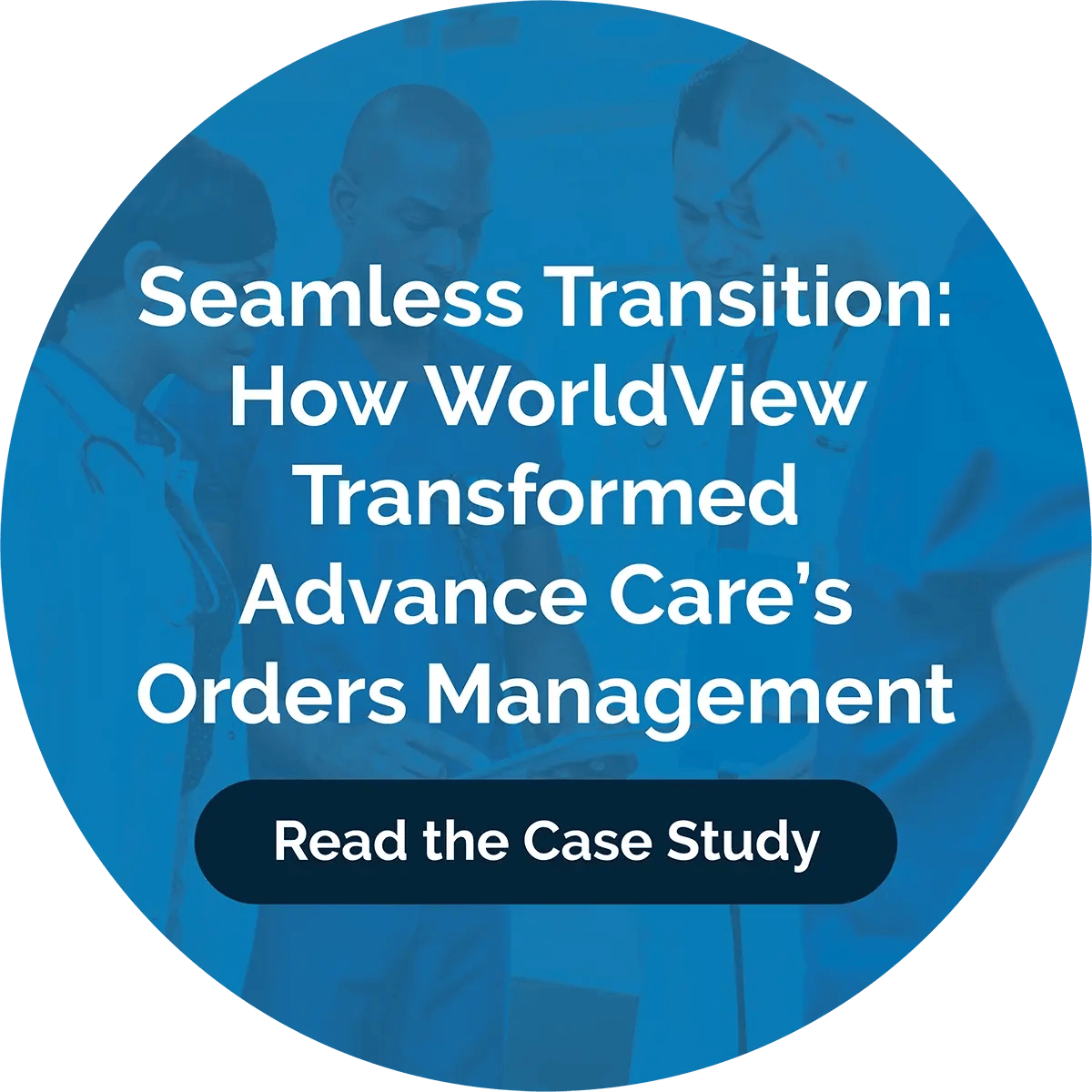How Home Health Agencies Can Enhance Dementia Treatment at Home

As the population ages, healthcare needs are shifting. Dementia cases are expected to increase in the next decade, which will lead to a rise in the need for specialized care. Currently, only about 5% of care facilities specialize in dementia care. In the coming years, it will become more and more crucial for care facilities and home health care agencies to offer dementia care.
In-home dementia care is an excellent option for patients who would benefit from receiving dementia treatment at home, as well as those who lack access to a specialized facility. WorldView’s Home Health solutions make it easier for you and your team to provide dementia care services. You can easily share and store documents, collect electronic signatures, and manage wound images with a HIPAA-compliant platform.
Understanding Dementia in a Home Health Setting
Dementia comes in multiple forms. You are likely familiar with Alzheimer’s Disease, which is a common type of dementia that impacts memory, thinking, language, and perception. Vascular dementia occurs when damaged blood vessels in the brain block oxygen. Lewy Body dementia is caused by abnormal protein deposits and changes a person’s behavior or mood.
Caring for Alzheimer’s and dementia patients offers unique challenges because patients with these conditions are prone to emotional outbursts and inappropriate behavior. These patients need consistent care because they may wander from home or be unable to perform daily personal care tasks like getting dressed or feeding themselves.
To treat these patients, you need a patient-centric care plan tailored to their unique needs. A solution such as WorldView’s Mobile Complete can make it easier for physicians, nurses, therapists, and other members of a patient’s care team to coordinate in order to provide consistent treatment that focuses on the patient's specific needs.
The Role of Home Health Care in Dementia Treatment
In many cases, it's beneficial for dementia patients to remain at home for as long as possible. However, dementia treatment at home is often managed primarily by a patient's family members. Family members caring for dementia patients tend to be more stressed than those caring for people with other conditions because of the challenges dementia patients present. The symptoms of dementia are progressive, meaning a patient's care needs will evolve and increase over time, often leading to negative mental health consequences for family caregivers. In addition, many people caring for a family member with dementia are also juggling other responsibilities, making the rising caregiver burden untenable.
Your home health agency can alleviate the stress on these family members. You can work with patients' families to make sure their loved one receives personalized, comprehensive care from a specialized team of professionals.
Challenges in Dementia Care for Home Health Providers
Caregivers of dementia patients often face depression and anxiety because dementia care is so taxing. People with dementia often wander, and they experience agitation and difficulties communicating. These patients require around-the-clock monitoring.
In-home health providers working with dementia patients need to document changes in condition and behavior promptly in order to address concerns. In a home-health setting, every member of a patient's care team might not be around to observe any changes in a patient's condition as they occur, so detailed, consistent documentation is crucial in order to keep everyone in the loop.
Leveraging Technology to Improve Dementia Care
Dementia care management is easier with technology. You can use electronic documents to make sure every member of a patient’s care team has access to home health data. With tools such as WorldView’s Referral AI management tool, you can onboard patients and request their medical records quickly and efficiently. And tools like MedAttach let you upload and share records with other caregivers.
These tools help professional caregivers optimize their dementia care workflows by providing easy access to a patient’s medical records and, where applicable, hospice data. It's crucial for caregivers to be able to access patient records at all times so they can monitor how their patient's condition is progressing.
Best Practices for Managing Dementia in Home Health
Dementia care management is easier when you follow best practices. Start by taking a patient-centered approach to your care plan. Each patient is unique. Honor their emotions and tailor interactions to each patient’s cognitive state. Get to know your patients so you can determine if their behavioral issues stem from isolation or a lack of interpersonal relationships. Be patient with them.
When communicating with a patient who has dementia, use clear language and speak slowly. Maintain eye contact and be reassuring while using non-verbal cues to comfort them. Train your staff to recognize the warning signs of a change in each patient’s condition. Subtle changes in behavior or restlessness could indicate that your patient’s condition is progressing. They may have trouble remembering words. Look for these and other signs and document them early to revise your care plan.
Conclusion
Dementia presents a unique set of challenges for home health professionals. Because these patients are prone to outbursts and behavioral changes, their care is often stressful. It’s important to document changes in behavior and keep accurate home health data. Dementia patient monitoring is crucial for their safety. Electronic documents and health records should be easily accessible to caregivers.
Using healthcare AI and other technology can help you monitor a patient’s condition by assessing their documentation for warning signs. Eventually, your patients may need to move from in-home dementia care to a specialized facility. Technology helps you decide when to make this call.
WorldView’s home health solutions make dementia patient care easier. You can track referrals and finish the intake process faster without waiting to compile healthcare records. Our referral AI tool organizes documents and handles manual work so you can spend more time with your patient. Learn how these and other tools can benefit your practice by scheduling a demo today.
Blog Post Tags
Home Care Management, Healthcare, Better Charting, AI, referrals, Automation, Referral AIGet Awesome Content Delivered Straight to Your Inbox!
Posts by topic
- Healthcare
- Business
- AI
- Hospice
- AP Workflows
- Home Care Management
- hospice-care
- General
- Industry Insights
- agency
- Blog
- Commercial
- reporting
- Data Analytics
- billing
- referrals
- News
- Referral AI
- business goals
- Operations
- business development
- partners
- Integration
- Healthcare Trends
- leadership
- Medicare
- Compliance
- audit
- medicaid
- Better Charting
- Home Health Reimbursement
- Medicare Compliance
- regulations
- Application
- Automation
- CMS Updates
- finance
- CRM
- DMSi
- Events
- KanTime
- LUPA Threshold
- Press Release
- Revenue Growth
- home Health Operations
- hospice workflow
- Announcements
- Artificial Intelligence
- EHR
- ESign
- Guides
- Homecare Homebase
- Mobile
- PDGM 2026
- Physician Order Tracking
- axxess
- clinical
- document management
- interoperability
- mobile documentations
- payor
- secure messaging healthcare
- workflow automation See All See Less


.png?width=596&name=23%20(1).png)
.png?width=596&name=1%20(18).png)
.png?width=596&name=1%20(14).png)